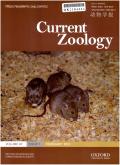城市化不会增加疣猴的 "好奇心",但半城市化个体会选择性地探索与食物有关的人为物品
IF 2
2区 生物学
Q2 ZOOLOGY
引用次数: 0
摘要
城市环境使动物接触到丰富的人为材料和食物,这些材料和食物有利于具有机会性饮食和高度行为灵活性的物种进行觅食创新。恋新和探索倾向被认为是动物在城市环境中生存的重要行为特征。绒猴(Chlorocebus pygerythrus)是少数几种成功适应城市环境的灵长类动物之一,因此是研究这些特征的理想物种。我们采用种内跨栖息地的方法,比较了半城市猴子、野生猴子和圈养猴子的恋新癖和对新奇物体的探索(共同称为 "物体好奇心"),以揭示促进城市生活的认知特征。为了测量 "物体好奇心",我们让猴子接触各种类型的新奇刺激,并比较它们的接近和探索行为。我们的结果显示,不同栖息地类型的猴子对新奇刺激的接近次数和探索行为存在差异。人工饲养绒猴的探索性明显高于半人工饲养绒猴和野生绒猴,这表明与人类相处的积极经历和缺乏捕食,而不是接触人类物质本身会影响对物体的好奇心。在所有栖息地中,幼年雄性是探索性最强的年龄性别类。这可能是由于雄性是散居的性别,而且幼年雄性更有动力去了解它们所处的环境。此外,我们还发现,与人类食物相关的物品比与食物无关的物品能引起半城市猴更强烈的探索反应,这表明半城市猴的探索动机可能是由 "恋人癖 "驱动的,即它们在类似的人类食物来源上觅食的奖励经验。我们的结论是,不同程度的与人类接触、捕食和预先接触人类食物包装可以解释我们的疣猴样本中 "物体好奇心 "的变化。本文章由计算机程序翻译,如有差异,请以英文原文为准。
Urbanization does not increase ‘object curiosity’ in vervet monkeys, but semi-urban individuals selectively explore food related anthropogenic items
Urban environments expose animals to abundant anthropogenic materials and foods that facilitate foraging innovations in species with opportunistic diets and high behavioural flexibility. Neophilia and exploration tendency are believed to be important behavioural traits for animals thriving in urban environments. Vervet monkeys (Chlorocebus pygerythrus) are one of few primate species that have successfully adapted to urban environments, thus making them an ideal species to study these traits. Using a within-species cross-habitat approach, we compared neophilia and exploration of novel objects (jointly referred to as ‘object curiosity’) between semi-urban, wild, and captive monkeys to shed light on the cognitive traits facilitating urban living. To measure ‘object curiosity’, we exposed monkeys to various types of novel stimuli and compared their approaches and explorative behaviour. Our results revealed differences in the number of approaches and explorative behaviour towards novel stimuli between the habitat types considered. Captive vervet monkeys were significantly more explorative than both semi- urban and wild troops, suggesting that positive experiences with humans and lack of predation, rather than exposure to human materials per se, influence object curiosity. Across habitats, juvenile males were the most explorative age-sex class. This is likely due to males being the dispersing sex and juveniles being more motivated to learn about their environment. Additionally, we found that items potentially associated with human food, elicited stronger explorative responses in semi-urban monkeys than non-food related objects, suggesting that their motivation to explore might be driven by “anthrophilia” i.e., their experience of rewarding foraging on similar anthropogenic food sources. We conclude that varying levels of exposure to humans, predation and pre-exposure to human food packaging explain variation in ‘object curiosity’ in our sample of vervet monkeys.
求助全文
通过发布文献求助,成功后即可免费获取论文全文。
去求助
来源期刊

Current Zoology
Agricultural and Biological Sciences-Animal Science and Zoology
CiteScore
3.20
自引率
9.10%
发文量
111
审稿时长
6 weeks
期刊介绍:
About the Journal
Current Zoology (formerly Acta Zoologica Sinica, founded in 1935) is an open access, bimonthly, peer-reviewed international journal of zoology. It publishes review articles and research papers in the fields of ecology, evolution and behaviour.
Current Zoology is sponsored by Institute of Zoology, Chinese Academy of Sciences, along with the China Zoological Society.
 求助内容:
求助内容: 应助结果提醒方式:
应助结果提醒方式:


